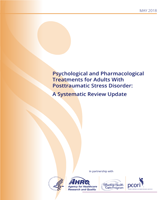From: Results

NCBI Bookshelf. A service of the National Library of Medicine, National Institutes of Health.
| Treatment | Outcome | N Trials (Subjects) | Findings | SOE |
|---|---|---|---|---|
| Cognitive processing therapy | PTSD symptomsa | 5 (399)1–4, 6 | Reduced PTSD symptoms SMD −1.35 (95% CI, −1.77 to −0.94) | Moderate |
| Loss of PTSD diagnosis | 4 (299)1–4 | Greater loss of PTSD diagnosis RD 0.44 (95% CI, 0.26 to 0.62) | Moderate | |
| Depression symptomsb | 5 (399)1–6 | Reduced depression symptoms SMD −1.09 (95% CI, −1.52 to −0.65) | Moderate | |
| Cognitive therapy | PTSD symptomsa | 4 (283)5, 7–9 | Reduced PTSD symptoms SMD of individual studies range from −2.0 to −0.3 | Moderate |
| Loss of PTSD diagnosis | 4 (283)5, 7–9 | Greater loss of PTSD diagnosis RD 0.55 (95% CI, 0.28 to 0.82) | Moderate | |
| Depression symptomsb | 4 (283)5, 7–9 | Reduced depression symptoms Between-group mean differences of individual trials ranged from −11.1 to −8.3 | Moderate | |
| Cognitive behavioral therapy-exposure | PTSD symptomsa | 13 (885)3, 10–21 8 (689)3, 10, 11, 13, 16, 18, 20, 21 | Reduced PTSD symptoms SMD −1.23 (95% CI, −1.50 to −0.97) SMD CAPS −1.12 (95% CI, −1.42 to −0.82) | High |
| Loss of PTSD diagnosis | 6 (409)3, 13, 14, 16, 17, 21 | Greater loss of PTSD diagnosis RD 0.56 (95% CI, 0.35 to 0.78) | Highc | |
| Cognitive behavioral therapy-exposure (continued) | Depression symptomsb | 10 (715)3, 11–15, 18–21 | Reduced depression symptoms SMD −0.76 (95% CI, −0.91 to ‑0.60) | High |
| Cognitive behavioral therapy-mixed | PTSD symptomsa | 21 (1,349)12, 14, 22–40 11 (709)22, 23, 27–29, 34–39 | Reduced PTSD symptoms SMD −1.01 (95% CI, −1.28 to −0.74) SMD −1.24 (95% CI, −1.67 to −0.81) | Highc |
| Loss of PTSD diagnosis | 9 (474)22–24, 31–34, 39, 41 | Greater loss of PTSD diagnosis RD 0.29 (95% CI, 0.11 to 0.41) | Highc | |
| Depression symptomsb | 15 (929)12, 14, 22–24, 28, 29, 33, 35–40, 42 | Reduced depression symptoms SMD −0.87 (−1.14 to −0.61) | Highc | |
| Eye movement desensitization and reprocessing | PTSD symptomsa | 8 (449)13, 16, 43–48 | Reduced PTSD symptoms SMD −1.08 (95% CI, −1.82 to −0.35) | Moderated |
| Loss of PTSD diagnosis | 7 (427)13, 16, 43–45, 47, 48 | Greater loss of PTSD diagnosis RD 0.43 (95% CI, 0.25 to 0.61) | Moderate | |
| Depression symptomsb | 7 (347)13, 43–48 | Reduced depression symptoms SMD −0.91 (95% CI, −1.58 to ‑0.24) | Moderate | |
| Brief eclectic psychotherapy | Loss of PTSD diagnosis | 3 (96)49–51 | Greater loss of PTSD diagnosis RD of individual studies ranged from 0.13 to 0.58 | Low |
| Depression symptomsb | 3 (96)49–51 | Reduced depression symptoms | Low | |
| Imagery rehearsal therapy | PTSD symptomsa | 1 (168)52 | Reduced PTSD symptoms Between-group mean difference −21.0; p<0.05 | Low |
| Narrative exposure therapy | PTSD symptomsa | 3 (232)53–55 | Reduced PTSD symptoms SMD range from −1.95 to −0.79 across 3 individual studies | Moderate |
| Loss of PTSD diagnosis | 2 (198)53, 54 | Greater loss of PTSD diagnosis RD of 0.06 and 0.43 in individual studies | Low | |
| Seeking Safety | PTSD symptomsa | 3 (232)56–58 | Reduced PTSD symptoms SMD of individual trials ranged from −0.22 to 0.04 | Low for no difference |
| Trauma affect regulation | PTSD symptomsa | 2 (173)59, 60 | Reduced PTSD symptoms Between-group mean difference of −17.4 and −2.7 in individual studies | Low |
NOTE: Outcomes graded as insufficient are not included in this table.
SMD from the Clinician-Administered PTSD Scale; SMD from various PTSD symptom scales.
SMD from the Beck Depression Inventory; SMD from various depression symptom scales.
SOE increased from moderate to high because of additional evidence of efficacy published since prior PTSD review.
SOE increased from low to moderate because of additional evidence of efficacy published since prior PTSD review.
CAPS = Clinician-Administered PTSD Scale; CI = confidence interval; N = number of subjects; PTSD = posttraumatic stress disorder; RD = risk difference; SMD = standardized mean difference; SOE = strength of evidence.
From: Results

NCBI Bookshelf. A service of the National Library of Medicine, National Institutes of Health.